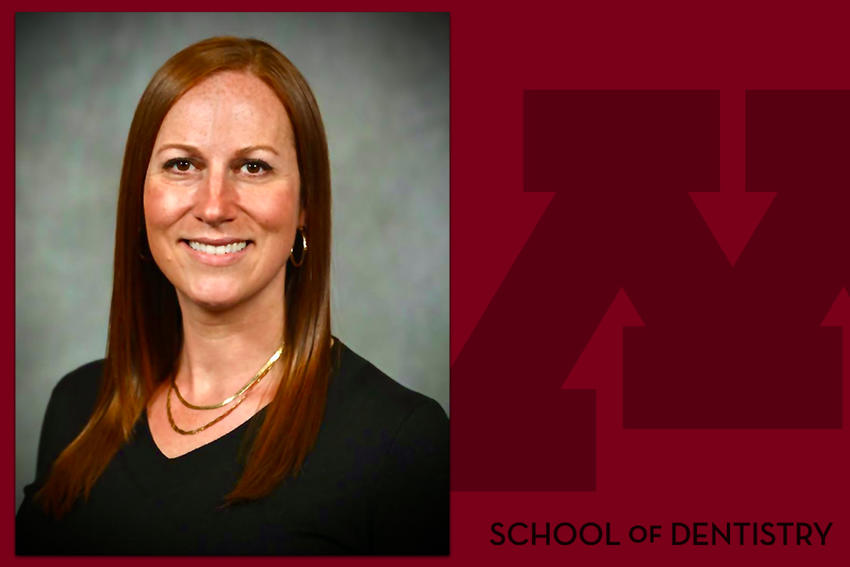Arnett receives Colgate grant for research on motivational interviewing

Michelle Arnett, RDH, MS, BS, assistant professor of dental hygiene, received a Colgate CARES award to explore the efficacy of motivational interviewing (MI) at oral hygiene appointments.
The Colgate Award for Research Excellence is a year-long research grant that provides $30,000 to a researcher in their first five years as an investigator. According to Colgate, “the goal of the program is to advance oral healthcare therapies in the realm of basic science, translational science and clinical care.” Arnett is the second dental hygienist in the Colgate CARE grant history to win this competitive grant.
Arnett’s soon-to-be-funded study dates back to her start at the University of Minnesota in 2018 and her first clinical trial as a principal investigator. She launched a clinical trial on MI compared to traditional oral hygiene instructions (OHI) to determine the impact on plaque scores, bleeding on probing and gingival index, and found a statistically significant difference in gingival index when patients underwent MI, rather than a more traditional tell-show-do model.
Though the trial briefly paused due to the COVID-19 pandemic, it was completed in 2020 and the findings are anticipated to be published in the Journal of Dental Hygiene Fall 2022. However, Arnett recognized that “much of the literature shows how COVID had an effect on patients’ motivation and mental health, which can have an impact on oral self care.” She was interested to see how, if at all, the work she had done with MI stuck with patients throughout the pandemic in this 2-year follow-up study
That inspired the first part of Arnett’s grant application: inviting the first round of patients back to collect longitudinal data on the three variables tested. “They may or may not have had regular dental care since they completed the study,” she explained. “So I would like to find out if those three outcome measures were maintained or how they changed over time.”
A second part of the study came from a tendency Arnett noticed throughout the first study: while her tell-show-do patients stayed on topic and only covered the variables tested, patients who received MI often ended up disclosing other health information, which she discussed with them.
“Many times our conversations led into diet and better sleep, exercise, and even alcohol or chemical dependency,” she said. Because the original OHI sessions for both control and test groups were recorded to ensure MI fidelity, Arnett had the idea to transcribe and code those interviews to determine whether, in fact, MI allows for a more comprehensive examination and conversation.
“I think this is where there might be a gap in MI research,” Arnett explained. “In dentistry, we are often so focused on clinical outcomes that are measurable, but if motivational interviewing is evoking patients to have better sleep and mental/emotional coping strategies, or improving diet and exercise, that ultimately means better oral health.”
Arnett is excited to see both the longitudinal impacts of MI, as well as whether it has a greater impact on oral and systemic health. She applied for the Colgate CARE grant to further this research because it recognizes researchers within their first five years of clinical research, a role into which she fits as a principal investigator.
“I like that the grant supports up-and-coming researchers, because we have to start somewhere,” she said. “If someone doesn’t give us a chance, we can’t do what we’re passionate about, and we can’t answer those important research questions.”
When she found out she received the grant funding, Arnett was ecstatic. She is especially excited that this grant allows her to further explore the retrospective data on MI through transcription and coding—and she can’t wait to see what that reveals.
“I’m a big believer in the patient-provider relationship: building trust, helping your patient achieve their goals and what they want from oral-systemic health,” she said. “We need a better communication approach for patients that are interested in positive behavior change, and I believe utilizing MI will help patients reach their goals”